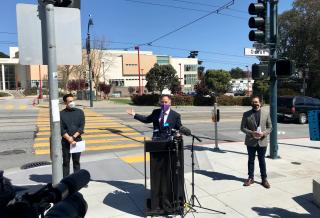One North County School Managed to Open and (Mostly) Stay Open
For several months, roughly 700 students have shown up to Bear Valley Middle School in Escondido twice a week for in-person learning. As others figure out how to slowly bring students back, schools like Bear Valley offer insight into how it could work.
Publication: Voice of San Diego
It is a rare sight, especially for a public middle or high school in San Diego.
For several months, roughly 700 students have shown up to Bear Valley Middle School in Escondido twice a week for in-person learning. Half come Tuesdays and Thursdays and the other half, Wednesdays and Fridays.
School days and classrooms look different this year. School administrators check temperatures and screen students for coronavirus symptoms in the morning. Anyone with even a headache or runny nose is sent home. Students must enter campus at three different points, depending on their grade level.
...
The state coronavirus funding package passed earlier this month that contained incentives is providing extra reopening motivation for schools, but even that aid is focused on elementary students. Districts with secondary grades, like middle and high school, only have to offer one grade level in-person instruction to qualify for the funds this year, in addition to identified vulnerable student groups like those experiencing homelessness.
During the bill’s hearings, some state legislators expressed concerns secondary students and their parents were being left behind.
“We needed to set a floor that we thought districts could reasonably achieve. … So, we needed something that was aspirational, but also achievable,” said state Assemblyman Phil Ting of San Francisco, chair of the Assembly budget committee and vocal critic of schools that have remained closed. “Of course, my preference would be to, you know, open middle schools up and if there is a safe way, to open up high schools. … I think we struck a balance.”
While others are just getting started and still struggling to figure out how to logistically make school reopenings work, districts like Escondido Union will easily qualify for the incentives and keep welcoming kids to school. ...
